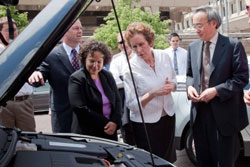President Obama wants the federal fleet of more than 600,000 vehicles to use alternative fuels by 2015.
The goal of the Presidential Memorandum issued today implementing new Federal fleet management practices is “to cut oil imports by one-third by 2025 and to put one million advanced vehicles on the road by 2015.”
By December 31, 2015, all new light duty vehicles leased or purchased by agencies must be alternative fueled vehicles, such as hybrid or electric, compressed natural gas, or biofuel. Moreover, agency alternative fueled vehicles must, as soon as practicable, be located in proximity to fueling stations with available alternative fuels, and be operated on the alternative fuel for which the vehicle is designed. Where practicable, agencies should encourage development of commercial infrastructure for alternative fuel or provide flex fuel and alternative fuel pumps and charging stations at Federal fueling sites.
 U.S. Department of Energy Secretary Steven Chu, U.S. General Services Administrator Martha Johnson and White House Council on Environmental Quality Chair Nancy Sutley came together to make the announcement on Tuesday and to look over alternative fuel options like the new Chevrolet VOLT electric vehicle.
U.S. Department of Energy Secretary Steven Chu, U.S. General Services Administrator Martha Johnson and White House Council on Environmental Quality Chair Nancy Sutley came together to make the announcement on Tuesday and to look over alternative fuel options like the new Chevrolet VOLT electric vehicle.
The ethanol industry was pleased that the administration is interested in getting more flex-fuel vehicles. “By ordering the purchase of Flex Fuel vehicles capable of running on a range of ethanol blends, and encouraging installation of Flex Fuel pumps, this Executive Order will help us achieve the President’s energy security goal of reducing our dependence on foreign oil,” said Chris Thorne with the ethanol group Growth Energy.
National Biodiesel Board (NBB) chairman Gary Haer, vice president of Renewable Energy Group (REG), said the White House directive provides more opportunities for biodiesel growth in the federal fleet which uses more than 66 million gallons of diesel fuel and 6.5 million gallons of biodiesel each year. “Dozens of local governments, universities and other institutions already are using biodiesel to help green their fleets,” said Haer. “It’s something the federal government could do immediately, without leaving the taxpayer a big bill for new equipment.”

